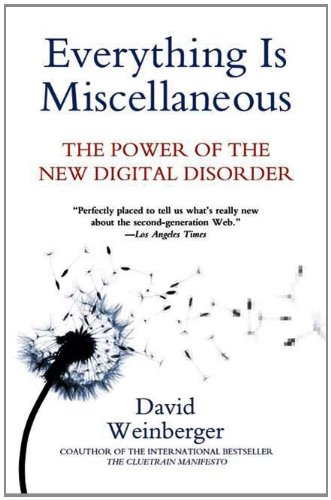Cheap Everything Is Miscellaneous: The Power of the New Digital Disorder Discount Review Shop
 Available at Amazon
Available at Amazon
Cheap "Everything Is Miscellaneous: The Power of the New Digital Disorder" Discount Review Shop
"Everything Is Miscellaneous: The Power of the New Digital Disorder" Overview
"Everything Is Miscellaneous: The Power of the New Digital Disorder" Specifications
Human beings are information omnivores: we are constantly collecting, labeling, and organizing data. But today, the shift from the physical to the digital is mixing, burning, and ripping our lives apart. In the past, everything had its one place--the physical world demanded it--but now everything has its places: multiple categories, multiple shelves. Simply put, everything is suddenly miscellaneous.
In Everything Is Miscellaneous, David Weinberger charts the new principles of digital order that are remaking business, education, politics, science, and culture. In his rollicking tour of the rise of the miscellaneous, he examines why the Dewey decimal system is stretched to the breaking point, how Rand McNally decides what information not to include in a physical map (and why Google Earth is winning that battle), how Staples stores emulate online shopping to increase sales, why your children’s teachers will stop having them memorize facts, and how the shift to digital music stands as the model for the future in virtually every industry. Finally, he shows how by "going miscellaneous," anyone can reap rewards from the deluge of information in modern work and life.
From A to Z, Everything Is Miscellaneous will completely reshape the way you think--and what you know--about the world.
The Flocking of Information: An Amazon.com Exclusive Essay by David Weinberger
 As businesses go miscellaneous, information gets chopped into smaller and smaller pieces. But it also escapes its leash--adding to a pile that can be sorted and arranged by anyone with a Web browser and a Net connection. In fact, information exhibits bird-like "flocking behavior," joining with other information that adds value to it, creating swarms that help customers and, ultimately, the businesses from which the information initially escaped.
As businesses go miscellaneous, information gets chopped into smaller and smaller pieces. But it also escapes its leash--adding to a pile that can be sorted and arranged by anyone with a Web browser and a Net connection. In fact, information exhibits bird-like "flocking behavior," joining with other information that adds value to it, creating swarms that help customers and, ultimately, the businesses from which the information initially escaped. For example, Wize.com is a customer review site founded in 2005 by entrepreneur Doug Baker. The site provides reviews for everything from computers and MP3 players to coffee makers and baby strollers. But why do we need another place for reviews? If you’re using the Web to research what digital camera to buy for your father-in-law, you probably feel there are far too many sites out there already. By the time you have scrolled through one store’s customer reviews for each candidate camera and then cross-referenced the positive and the negative with the expert reviews at each of your bookmarked consumer magazines, you have to start the process again just to remember what people said. Wize in fact aims at exactly that problem. It pulls together reviews from many outside sources and aggregates them into three piles: user reviews, expert reviews (with links to the online publications), and the general "buzz." (For shoppers looking for a quick read on a product, Wize assigns an overall ranking.) When Wize reports that 97 percent of users love the Nikon D200 camera, it includes links to the online stores where the user reviews are posted, so customers are driven back to the businesses to spend their money.
Zillow.com does something similar for real estate. The people behind Expedia.com, Rich Barton and Lloyd Frink, were looking for a new business idea--and were in the market for new homes. After hunting for information, they found that most of it was locked into the multiple listings sites of the National Association of Realtors. Now Zillow takes those listings and mashes them up with additional information that can help a potential purchaser find exactly what she wants. The most dramatic mashup right now is the "heat map" that uses swaths of color to let you tell at a glance what are the most expensive and most affordable areas. At some point, though, Zillow or one of its emerging competitors will mash up listing information with school ratings, crime maps, and aircraft flight patterns.
Wize and Zillow make money by selling advertising, but their value is in the way their sites aggregate the miscellaneous--letting lots of independent sources flock together, all in one place.
We’re seeing the same trend in industry after industry, including music, travel, and the news media. Information gets released into the wild (sometimes against a company’s will), where it joins up with other information, and the act of aggregating adds value. Companies lose some control, but they gain market presence and smarter customers. The companies that are succeeding in the new digital skies are the ones that allow their customers to add their own information and the aggregators to mix it up, because whether or not information wants to be free, it sure wants to flock.
 Available at Amazon
Available at AmazonCheap "Everything Is Miscellaneous: The Power of the New Digital Disorder" Discount Review Shop
"Everything Is Miscellaneous: The Power of the New Digital Disorder" Related Products
- Cognitive Surplus: Creativity and Generosity in a Connected Age
- Small Pieces Loosely Joined: A Unified Theory Of The Web
- What Technology Wants
- Here Comes Everybody: The Power of Organizing Without Organizations
- Scholarship in the Digital Age: Information, Infrastructure, and the Internet
My Links : Best Fiction Audio Books Non Fiction Ebooks Sale Reference Ebook

No comments:
Post a Comment